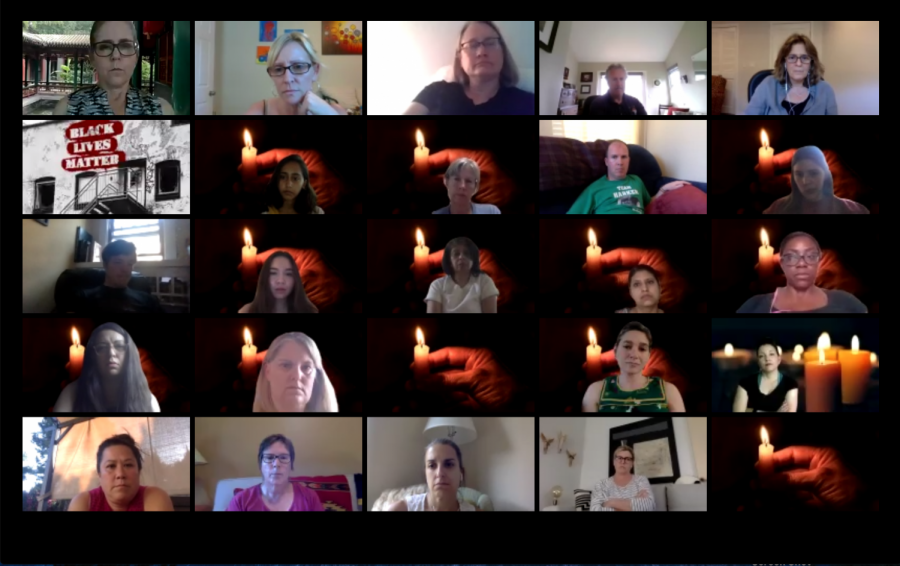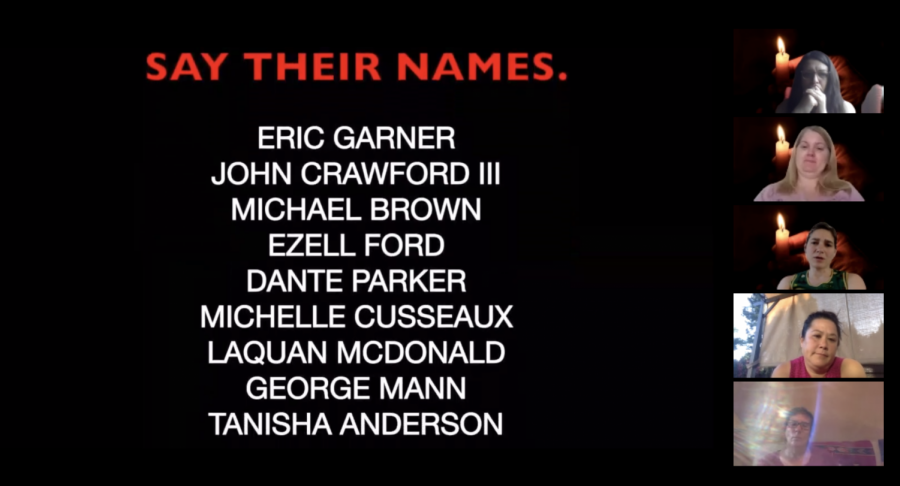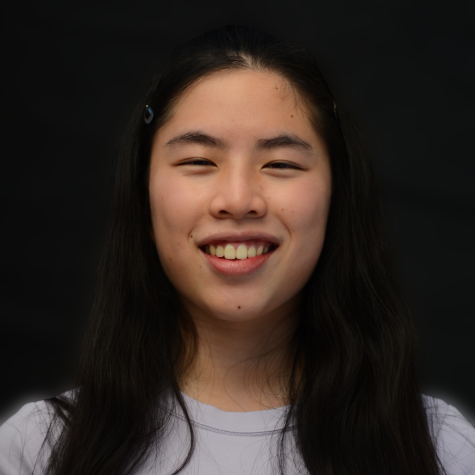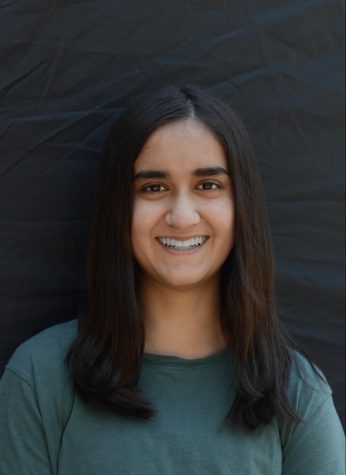Harker community holds vigil to discuss racism and current Black Lives Matter protests
Attendees at the virtual Solidarity and Fellowship Vigil used images of candles as their Zoom backgrounds to symbolize their support and solidarity. The hosts provided the photo of the candle in the Zoom chat for participants to download.
June 7, 2020
Over 250 Harker students, faculty, staff and alumni attended the virtual Solidarity and Fellowship Vigil event on Thursday evening to speak about issues of racial inequality and community exclusion in an hour of open discussion.
The Harker Diversity Committee organized the vigil in light of the recent killing of African American George Floyd at the hands of a white police officer on May 25 in Minneapolis, which sparked outrage and protests across America.
As attendees entered the Zoom meeting, the hosts — middle school Director of Innovation, Learning and Design Dr. Abigail Joseph, who is African American, and Diversity Committee co-chair Mark Janda, who is white — played songs “Stand by Me” by Ben E. King and “What’s Going On” by Marvin Gaye, as well as a video of the Black National Anthem with a special performance by junior Dylan Williams.
African American Brian Pinkston (11) and Asian Americans Natasha Yen (11) and Uma Iyer (10), students on the Diversity Committee, spoke at the beginning of the meeting about the tragedy of Floyd’s death, which mirrored African American Eric Garner’s death in 2014. Both men’s final words, “I can’t breathe,” spoken as they were pinned to the ground by police, have become a slogan associated with the Black Lives Matter (BLM) movement.
The students also set down the norms for the night, inviting attendees to speak for one minute from the “I” perspective and asking them to respect the confidentiality of those who shared their experiences. The committee provided access to an image of a candle for the Harker community to use as their Zoom background in order to show their solidarity with African Americans.
“We encourage you to challenge yourself,” Brian said to attendees. “We encourage you to listen and then think and then speak. Embrace discomfort. Both comfort the disturbed and disturb the comfortable. Accept conflict as a catalyst for change.”
African American alumni Marcus Tymous (‘19), Jalen Clark (‘18), Floyd Gordon (‘18) and Jadan McDermott (‘18) spoke candidly about challenges they faced at Harker and being part of a minority population within the student community. The majority of Harker students are Asian or white, which has created an environment of exclusivity and prejudice towards underrepresented minorities.
“I definitely felt like the vigil was a place where people [could] express their opinion and for once not face judgment,” Jalen said in an interview after the vigil. “I believe that the vigil was a step in the right direction.”
Other members of the community talked about their perspective on the BLM movement and vocalized concerns about the lack of inclusion of black students at Harker.
During the vigil, second grade teacher Ali Bo and third grade teacher Andi Bo, who are white, spoke about wanting to bring more books about diversity into the lower school library.
“We hope that what we’re saying encourages [you] to take this time to look at what books are in your library,” Andi Bo said in an interview after the vigil. “Are they diverse? Do people on the cover look like your students? Do they look like you? Do they look like other people in the world?”
While the topic of race and diversity is brought up in social studies classes, both teachers expressed their desire to extend the discussion to language arts classes as well and to increase books about racial diversity in lower school curriculum.
With the surge of #BlackLivesMatter posts that took over social media platforms like Instagram and Twitter last week, some community members also talked about the importance of using social media to spread awareness about the movement, in addition to taking the time to further educate themselves on issues that African Americans face today in America.
“I would encourage Harker students to take a moment, step back, read books by black authors, absorb information from the Internet, and then, after that, you can become a sincere and vocal ally for the [Black Lives Matter] movement,” Asian American Arusha Patil (11) said in an interview after the vigil.
Earlier on Thursday, head of school Brian Yager stated in a video message sent out to the school community via email that this vigil and the upcoming town hall are only a part of the action Harker is planning to take to foster acceptance of diversity on campus.
“While we’re doing some short-term items, as an institution, the real work is ongoing and long-term and will really persist for the rest of our lives,” Yager, who is white, said. “We’ve made a commitment as a school to continuing to better our country, our students and our world.”
During his statement, head of upper school Butch Keller, who is white, announced that Harker would be starting its first Black Student Union after African American students Brian, Dylan, and sophomore Brooklyn Cicero reached out to the administration. More information about this is yet to be released.
About an hour into the vigil, the Harker Diversity Committee played a video they created, titled “Say Their Names.” The video featured images of the civil rights movement and the modern BLM protests, as well as a list of black individuals who had been killed by police officers since 2014 that included 101 names.
To end the event, Dr. Joseph read an excerpt from a poem written by Maya Angelou for the 1995 Million Man March in Washington, D.C.
“Clap hands,” Dr. Joseph read from the poem. “Let hope live in our hearts. We have survived, and even thrived, with passion, compassion, humor and style.”
The town hall is set to take place this week, with specific details to be sent out by the Harker Diversity Committee. Anyone with ideas or questions to share with the Harker Diversity Committee can email [email protected].


















![“[Building nerf blasters] became this outlet of creativity for me that hasn't been matched by anything else. The process [of] making a build complete to your desire is such a painstakingly difficult process, but I've had to learn from [the skills needed from] soldering to proper painting. There's so many different options for everything, if you think about it, it exists. The best part is [that] if it doesn't exist, you can build it yourself," Ishaan Parate said.](https://harkeraquila.com/wp-content/uploads/2022/08/DSC_8149-900x604.jpg)




![“When I came into high school, I was ready to be a follower. But DECA was a game changer for me. It helped me overcome my fear of public speaking, and it's played such a major role in who I've become today. To be able to successfully lead a chapter of 150 students, an officer team and be one of the upperclassmen I once really admired is something I'm [really] proud of,” Anvitha Tummala ('21) said.](https://harkeraquila.com/wp-content/uploads/2021/07/Screen-Shot-2021-07-25-at-9.50.05-AM-900x594.png)







![“I think getting up in the morning and having a sense of purpose [is exciting]. I think without a certain amount of drive, life is kind of obsolete and mundane, and I think having that every single day is what makes each day unique and kind of makes life exciting,” Neymika Jain (12) said.](https://harkeraquila.com/wp-content/uploads/2017/06/Screen-Shot-2017-06-03-at-4.54.16-PM.png)








![“My slogan is ‘slow feet, don’t eat, and I’m hungry.’ You need to run fast to get where you are–you aren't going to get those championships if you aren't fast,” Angel Cervantes (12) said. “I want to do well in school on my tests and in track and win championships for my team. I live by that, [and] I can do that anywhere: in the classroom or on the field.”](https://harkeraquila.com/wp-content/uploads/2018/06/DSC5146-900x601.jpg)
![“[Volleyball has] taught me how to fall correctly, and another thing it taught is that you don’t have to be the best at something to be good at it. If you just hit the ball in a smart way, then it still scores points and you’re good at it. You could be a background player and still make a much bigger impact on the team than you would think,” Anya Gert (’20) said.](https://harkeraquila.com/wp-content/uploads/2020/06/AnnaGert_JinTuan_HoHPhotoEdited-600x900.jpeg)

![“I'm not nearly there yet, but [my confidence has] definitely been getting better since I was pretty shy and timid coming into Harker my freshman year. I know that there's a lot of people that are really confident in what they do, and I really admire them. Everyone's so driven and that has really pushed me to kind of try to find my own place in high school and be more confident,” Alyssa Huang (’20) said.](https://harkeraquila.com/wp-content/uploads/2020/06/AlyssaHuang_EmilyChen_HoHPhoto-900x749.jpeg)









